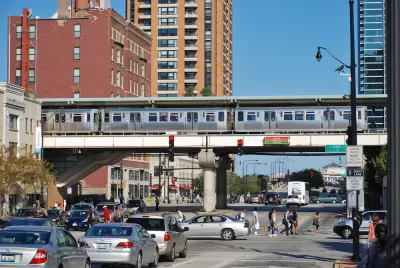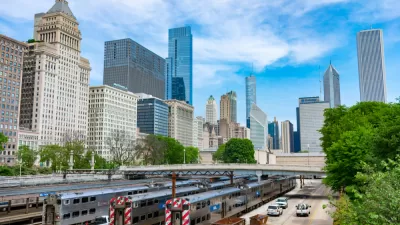The Equitable Transit-Oriented Development ordinance could advance equity and reduce car dependency, but the legislation faces resistance from some city council members.

An ordinance proposed by Chicago mayor Lori Lightfoot’s administration would encourage more transit-oriented development in the city. As John Greenfield writes in Streetsblog Chicago, “Equitable transit-oriented development – building generous amounts of affordable housing near rapid and/or high-frequency public transportation – is a powerful tool to reduce both segregation and car-dependency.” The Connected Communities Ordinance “builds on the city’s 2020 Equitable Transit Oriented Development Policy Plan, which outlined a comprehensive set of actions for officials to take over the next three years,” but the proposal faces opposition in City Council.
“While Streetsblog has been told city staffers are not allowed to share the latest draft of the ordinance, The Daily Line reported that Connected Communities includes almost a dozen measures to encourage transit-friendly housing and walkable streets near stations,” Greenfield reports. The ordinance would ease permitting for affordable housing developments and two- and three-flat housing near transit. “While Chicago typically requires a minimum number of car parking spots at new developments, according to The Daily Line the draft ordinance also included Chicago’s first parking maximum, a limit of no more than one space for every two apartments or condos.”
The ordinance has not yet been introduced to the city council. “Lightfoot recently explained that the legislation needs some more edits before it’s ready for its close-up.”
FULL STORY: Chicago’s proposed Equitable TOD ordinance would fight segregation and car-depedency

Planetizen Federal Action Tracker
A weekly monitor of how Trump’s orders and actions are impacting planners and planning in America.

Congressman Proposes Bill to Rename DC Metro “Trump Train”
The Make Autorail Great Again Act would withhold federal funding to the system until the Washington Metropolitan Area Transit Authority (WMATA), rebrands as the Washington Metropolitan Authority for Greater Access (WMAGA).

The Simple Legislative Tool Transforming Vacant Downtowns
In California, Michigan and Georgia, an easy win is bringing dollars — and delight — back to city centers.

The States Losing Rural Delivery Rooms at an Alarming Pace
In some states, as few as 9% of rural hospitals still deliver babies. As a result, rising pre-term births, no adequate pre-term care and "harrowing" close calls are a growing reality.

The Small South Asian Republic Going all in on EVs
Thanks to one simple policy change less than five years ago, 65% of new cars in this Himalayan country are now electric.

DC Backpedals on Bike Lane Protection, Swaps Barriers for Paint
Citing aesthetic concerns, the city is removing the concrete barriers and flexposts that once separated Arizona Avenue cyclists from motor vehicles.
Urban Design for Planners 1: Software Tools
This six-course series explores essential urban design concepts using open source software and equips planners with the tools they need to participate fully in the urban design process.
Planning for Universal Design
Learn the tools for implementing Universal Design in planning regulations.
Smith Gee Studio
City of Charlotte
City of Camden Redevelopment Agency
City of Astoria
Transportation Research & Education Center (TREC) at Portland State University
US High Speed Rail Association
City of Camden Redevelopment Agency
Municipality of Princeton (NJ)





























